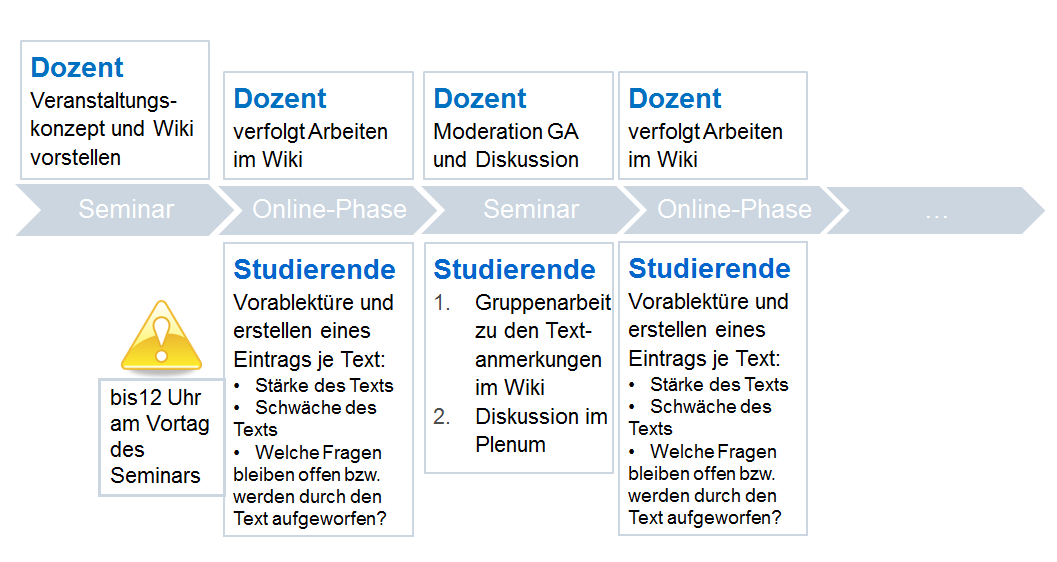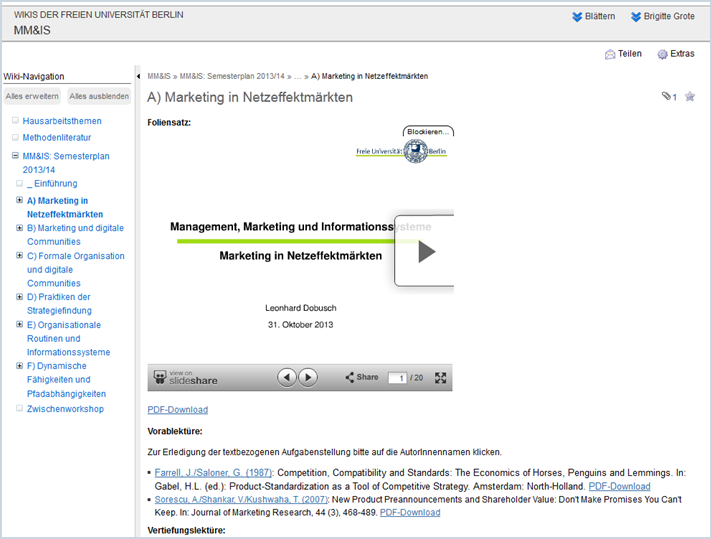Summary Accompanying wiki for the course "Management, Marketing and Information Systems" within the framework of the master's program Information Systems: In the first half of the course academic texts on phenomena in the context of management, marketing and information systems (IS) are discussed. In order to encourage and strengthen the interaction with the texts before the course sessions take place, the students have to post at least one entry within the wiki on the strengths or weaknesses of the text in preparation for the actual session. This can also include formulating questions that remain open after having read the text. The texts are provided as pdf files within the wiki as well as the teaching material (presentations) for the course. |
| Course title | "Management, Marketing & Information Systems" |
| Course type | Seminar Analysis and discussion of academic texts |
| Degree program | Information Systems M. Sc. |
| Department/Institute | Business Studies |
Lecturer | Prof. Dr. Leonhard Dobusch |
No. of participants | 30-35 participants |
| Duration | First half of the semester |
External tools can be optionally implemented as a supplement to the central systems of the Freie Universität (wiki, blog, LMS etc.). The description of the external applications (information on tools, implementation scenarios, practical examples) can be found in the IdeasBar for teaching and science 2.0. Please observe the data protection provisions of the Freie Universität Berlin: Using the central IT solutions at Freie Universität Berlin. |
In the seminar a wiki is used in order to intensify the interaction with the academic texts beforehand. The blended learning scenario allows for an online-supported self-study phase before the actual course; in the seminar itself the student results of the online phase are taken up and discussed. Illustration 1 illustrates the blended learning scenario.

Illustration 1: The blended learning scenario
The lecturer provides the texts that have to be read (mostly two to three) as a pdf page within a wiki page as preparatory work (self-study phase). Here the text-based tasks and the notes on the editing that needs to be undertaken are also described. In addition, the presentations of the lecturers (available via Slideshare) are integrated. By 12 noon on the day before the seminar session every participant must have made an entry to every text that had to be read regarding one of the following points:
Every participant therefore posts one entry for every text; which points he/she chooses to address from the list above is up to him/her. The entries are personalized; that means that every participant labels their own posts with an abbreviation of their initials. In the seminar sessions the lecturer takes up these entries at the start: In the first half the students work on the questions in smaller groups, then a discussion takes place in the plenary assembly. The entries in the wiki are added to active participation of the students, though they are not graded. This is correspondingly formulated in the wiki: "Component of active participation is working on the preparatory reading exercises within the scope of the pointers made within the framework of the course wiki".
The wiki can be viewed under "Management, Marketing & Information Systems". On the landing page of the wiki the idea of the wiki is described and there is a description of how to use it in the seminar. The subordinate pages are categorized as individual topics or course events.

Illustration 2: A session page of the wiki "Management, Marketing & Information Systems"
There were no complaints by the students having to do with usage problems with regard to the wiki. In how far this relates to the fact that we are dealing with an information studies master's program with a concurrent high IT affinity of the students cannot be said.
The extra work put in by the lecturer when compared to a typical Blackboard usage consisted of the following points:
The request to post entries on the texts read beforehand worked very well and functioned for the entire semester. It was only with the first task that there was a slight discrepancy regarding the distribution of the entries in favor of the strengths/weaknesses. This was not a problem anymore in the successive sessions after a note that the focus should be more on the open questions had been sent out. What was especially successful was the fact that the students could see and read their peers' posts. Thereby the number of redundant questions was quite low.
For future courses it could be an option of working with an embedded Google form in addition to entering the required posts in which the students can answer two to three multiple choice questions.